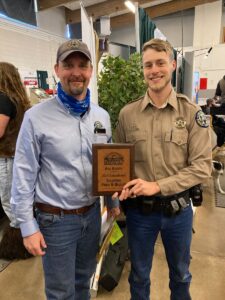FORT COLLINS, Colo. – Two wildland fire management agencies have announced a new agreement to proactively confront the wildfire crisis along Colorado’s northern Front Range. As part of the USDA Forest Service’s 10-year strategy to address the wildfire risk to infrastructure and communities, the Arapaho and Roosevelt National Forests & Pawnee National is making a multi-million dollar investment in shared resources with the Colorado Division of Fire Prevention and Control.
“Through partnerships with agencies such as the U.S. Forest Service, we can maximize the use of shared resources to effectively mitigate fire risk,” said DFPC Director Morgan. “Fire is a concern for our entire State, and this partnership is part of the long-term collaborative strategy to reduce the threat to our communities and natural resources.”
The first agreement of its kind between the two agencies, the effort involves implementing a preventative, cross-boundary approach to wildfire mitigation. A highlight of the agreement involves forming a joint wildland fire and fuels module focused on reducing hazardous fuels in and around the wildland-urban interface on both public and private lands. The module will focus on strategic project planning, information distribution, and wildfire mitigation implementation (e.g. thinning and prescribed burning).
“The Division and the Forest have a strong foundation of working together during wildfires,” said Forest Supervisor Monte Williams. “This is the first time our agencies have come together to get out ahead of the fires, to do some preventative planning and treatments across fence lines, and I’m really excited about all the doors this agreement opens for us.”
Funded by the Bipartisan Infrastructure Law and the Inflation Reduction Law, this collaborative effort will operate in the Front Range Priority Landscape, which includes areas along the Front Range from the Wyoming state line south to the I-70 corridor. This landscape is also part of the Northern Colorado Fireshed Collaborative, a partnership of federal, state and local natural resource agencies, non-profits, community groups, and researchers working to address wildfire risks to communities and keep Colorado’s water supplies reliable.
As part of this agreement, hiring for the new joint wildland fuels module is currently underway. The fuels module will be based out of the Division’s offices in Windsor.








